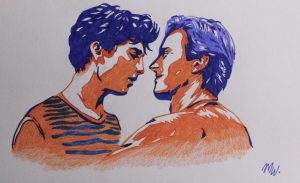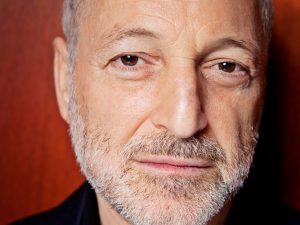
BY MAX WELLS
Elio.
Oliver.
Everyone will be saying their names soon.
You’ve probably heard of Call Me By Your Name by now, either because it’s being hailed as iconic gay cinema or you’ve had to Google what exactly is the infamous peach scene everyone’s talking about. Either way, the film is doing just peachy when it comes to critic reviews and box office success.
The story follows 17-year-old Elio Perlman (Timothée Chalamet) in Northern Italy during the summer of 1983. Every summer, Elio’s professor father (Michael Stuhlbarg) hires a young doctoral student to assist with his archaeology research and stay at their 17th-century villa. Elio soon meets his father’s handsome and carefree new student, Oliver (Armie Hammer), and is overwhelmed by his awakening obsessive attraction toward him. The two spend the rest of the summer playing a sensual game of cat-and-mouse, unaware their enchanting summer will impact their lives forever.
The film, which received three nominations at Sunday’s 75th Golden Globe awards, was adapted from André Aciman’s novel of the same name. Published in 2007, the novel won for best Gay Fiction at the 20th Lambda Literary Awards.
I recently spoke with Aciman, who is currently teaching literary theory at Graduate Center of City University of New York, about the transition of his story from page to screen, the story’s impact on the LGBT community, and his advice for young writers.
Q: What did it feel like the very first time you saw a full screening of the film?
A: I was in New York for the first ever showing, and I was late so I had to sit in the middle of the entire audience with my family. Suddenly, the thought occurs to me that if I didn’t have this idea, this theatre would be empty. In other words, you feel very rewarded and very happy. Everyone is there because of something I wrote.
I had already read the screenplay, so I wasn’t that surprised by what finally appeared. Watching the actors play my characters was amazing because I had no idea what they would look like, how they would dress. I was just amazed by how the film was produced because they gave me my characters, flesh and blood. I also think what it did beautifully was it kept building the tension between Elio and Oliver and that’s the feeling I wanted to give in the book, so I’m glad the film did that too.

Q: Were you scared of how society would react to the book and the film?
A: Well, as I was writing the book I wasn’t taking it seriously, it was more something fun to write while I was avoiding another novel that I was contracted to do. At the time I was allowing myself to just let myself go and just have fun with it, and I did. As I was writing, I realized at some point “wait this is a book here, how do I want to confront the public about this?” I have graduate students and I’m writing the “peach scene”and I thought “how inappropriate is it what I’m doing here?’ and I just said ‘I don’t care. Let people think what they want, I’m going to say what I have to say.’
Q: I read that you said you didn’t write the novel with the intent of it being such an emotional ending. Have you experienced any emotional reactions like this and what does it feel like seeing that?
A: You don’t have to see them! You can hear them crying. Sometimes I sneak into a screening as a private citizen, and I look at people and they’re sniffling away. What surprised me is that people can feel the story is coming to an end, and slowly they start to break down. I might have been slightly moved while writing the ending, but I wanted it to be an ending where people come to a reconciliation, and when you are resigned its painful, its almost a sort of grief that develops. I guess that’s the feeling they get.
Q: Does it bother you that media outlets are calling the story a gay story when both characters seem to be bisexual?
A: Not really I mean in my experience most heterosexual men are a bit bisexual and most gay men are a bit bisexual. I see it as very fluid, and I don’t care too much for labels. I’ll tell you what bothers me is when people speak about this story as ‘coming of age’, as if it only happens once in a lifetime. You can discover magic and romance at every stage of life. Hopefully you get to die desiring someone, I hope I do. If you stop desiring, you stop living.
Q: You have been in talks with the director of the film, Luca Guadagnino, about sequel plans, has this talk started to make you wonder about writing a sequel of your own?
A: I don’t know, really. We’ve spoken about sequels. We’ve thought about it, but I haven’t concretely devoted my attention to it, I feel very uncomfortable forcing it. Luca wants to do something, we played around with some ideas, and neither of us are too sure yet. We don’t want to let it go, you know, it’s so special but you can’t push out sequels just because you want one. I mean have you seen the Godfather Part Three? I never know where it’s going. I have to talk to the characters and see where they’re at.
Q: How does it feel to know your novel has impacted so many people, especially the LGBT community?
A: I mean you hear the words and you obviously understand them, but in the back of your mind you say “How did I do that? where? what point in the book or the movie?” I can understand concretely, but it hasn’t changed my life. I suppose it allows you to look into yourself and that’s all I can do is probe and keep probing until you can’t go any further. However, for some people coming out is traumatic and I wanted to say “Let’s stop the nonsense!” I want all fathers to be like Elio’s, and if they can’t, then they shouldn’t be fathers.

Q: Can you remember a book or author that you read as a student that was transformative, one that you might go back and read many times?
A: There’s a book called The Idiot by Fyodor Dostoyevsky. It’s fundamentally about how people read each other, I’ve always been really interested in how people mis-diagnose each other and themselves.I was always interested in making sure I wasn’t the only person who was sick and twisted (laughs), I was always looking into peoples hearts and souls, dead scared they might read me. Dostoyevsky taught me that there are people who are constantly on the lookout.
This happens a lot in Call Me By Your Name, Oliver will give Elio a glance and Elio is left wondering ‘is he mad or does he want something? Did I do something wrong?’ What I love is that eventually Elio needs to confront Oliver, just come out and say it, and I think speech can be very erotic. Speech can undress you completely. Another book that influenced me was The History of the Peloponnesian War by Thucydides. It just really studies human ambition and human stupidity.
Q: What advice do you give your students who are struggling with finding their voice and identity in their work?
A: What I can say is that you don’t want to have an idea behind what you’re writing. You don’t want to have a message, the story itself is already the message. Write the story from maybe a point of view, but don’t try to make it a book that’s going to be taught in a classroom, that’s the death of literature.
Read the Top 10 greatest books, read the classics, 1920 and earlier. Read them as a person who’s interested in writing not as a scholar. Also, you don’t have to be nice in your writing. Just avoid trying to find the teachability of a book. Personally, I prefer stories that are fundamentally tragic and ugly.
Call Me By Your Name is now playing at limited North American theatres.
